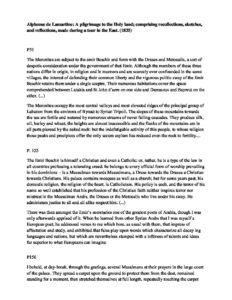P31
The Maronites are subject to the emir Beschir and form with the Druses and Metoualis, a sort of despotic consideration under the government of thet Emir. Although the members of these three nations differ in origin, in religion and in manners and are scarcely ever confounded in the same villages, the interest of defending their common liberty and the vigorous politic sway of the Emir Beschir retains them under a single sceptre. Their numerous habitations cover the space comprehended between Latakia and St John d’acre on one side and Damascus and Bayreut on the other. (…)
The Maronites occupy the most central valleys and most elevated ridges of the principal group of Lebanon from the environs of Byreut to Syrian Tripoli. The slopes of these mountains towards the sea are fertile and watered by numerous streams of never failing cascades. They produce silk, oil, barley and wheat; the heights are almost inaccessible and the flanks of the mountains are in all parts pierced by the naked rock: but the indefatigable activity of this people, to whose religion those peaks and precipices offer the only secure asylum has reduced even the rock to fertility….
P. 155
The Emir Beschir is himself a Christian and even a Catholic: or, rather, he is a type of the law in all countries professing a tolerating creed: he belongs to every official form of worship prevailing in his dominions – is a Mussulman towards Mussulmans, a Druse towards the Druses a Christian towards Christians. His palace contains mosques as well as a church; but for some years past, his domestic religion, the religion of the heart, is Catholicism. His policy is such, and the terror of his name so well established that his profession of the Christian faith neither inspires terror nor mistrust in the Mussulman Arabs, the Druses or the Metoualis who live under his sway. He administers justice to all and all alike respect him. (…)
There was then amongst the Emir’s secretaries one of the greatest poets of Arabia, though I was only afterwards apprised of it. When he learned from other Syrian Arabs that I was myself a European poet, he addressed verses to me which bore, as usual with them, that impress of affectation and study, and exhibited that false play upon words which characterize all decay ing languages and nations, but which are nevertheless stamped with a loftiness of talents and ideas far superior to what Europeans can imagine
P156
I beheld, at day-break, through the gratings, several Musulmans at their prayers in the large court of the palace. They spread a carpet upon the ground to protect them from the dust, remained standing for a moment, then stretched themselves at full length, repeatedly touching the carpet
with their foreheads, and always turning their faces towards the mosque; they afterwards lay down at full length with their faces to the carpet, again striking the ground with their foreheads, rose up, and frequently went over the same ceremonies, resuming the same attitudes, and muttering their prayers. I never could observe the slightest ridicule in those attitudes and ceremonies, however strange they appear to our ignorance. The physiognomy of Musulmans is so penetrated with the religious sentiment they express through these gestures, that I have always entertained the highest respect for their mode of praying; everything is sanctified by the motive. Whenever the idea of the divinity enters into and acts upon the heart of man. It imprints a superhuman dignity upon him. The following is the language that suggests itself on the occasion: –
“I worship not like thee but with thee, the common Lord of all, the Lord in whom thou bilievest, whom thou desirest to acknowledge and to honor, as I desire to acknowledge and honor him, in another manner. It ills becomes me to turn thee into ridicule – it behoves God alone to judge between us.”
Lamartine, Alphonse de, 1790-1869. English (no translator credited) New York, D. Appleton & company, 1848
